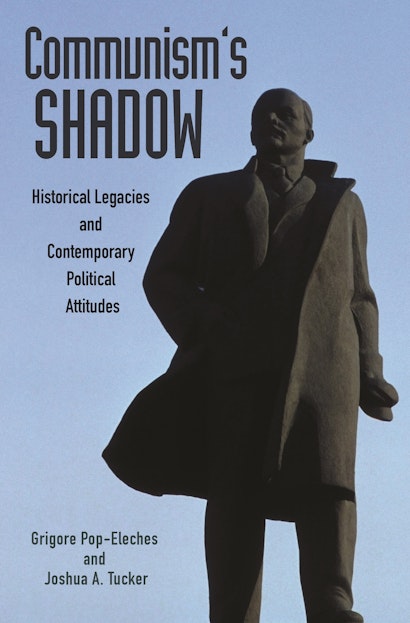It has long been assumed that the historical legacy of Soviet Communism would have an important effect on post-communist states. However, prior research has focused primarily on the institutional legacy of communism. Communism’s Shadow instead turns the focus to the individuals who inhabit post-communist countries, presenting a rigorous assessment of the legacy of communism on political attitudes.
Post-communist citizens hold political, economic, and social opinions that consistently differ from individuals in other countries. Grigore Pop-Eleches and Joshua Tucker introduce two distinct frameworks to explain these differences, the first of which focuses on the effects of living in a post-communist country, and the second on living through communism. Drawing on large-scale research encompassing post-communist states and other countries around the globe, the authors demonstrate that living through communism has a clear, consistent influence on why citizens in post-communist countries are, on average, less supportive of democracy and markets and more supportive of state-provided social welfare. The longer citizens have lived through communism, especially as adults, the greater their support for beliefs associated with communist ideology—the one exception being opinions regarding gender equality.
A thorough and nuanced examination of communist legacies’ lasting influence on public opinion, Communism’s Shadow highlights the ways in which political beliefs can outlast institutional regimes.
Grigore Pop-Eleches is professor of politics and international affairs at the Woodrow Wilson School at Princeton University. He is the author of From Economic Crisis to Reform. Joshua A. Tucker is professor of politics and (by courtesy) Russian and Slavic studies and data science at New York University. He is the author of Regional Economic Voting: Russia, Poland, Hungary, Slovakia, and the Czech Republic, 1990–1999.
"[An] immensely ambitious, careful, and data-rich study. . . . Those trying to pin down with greater precision the legacy of communism now have a model to emulate."—Robert Legvold, Foreign Affairs
"In this immensely ambitious, careful, and data-rich study, Pop-Eleches and Tucker do not merely explore the historical legacy of communism in eastern Europe; they also tackle the far more difficult problem of distinguishing its impact from that of other factors."—Foreign Affairs
"This is a pioneering and fascinating analysis. While previous scholarship has examined the impact of communist legacies on institutions and collective actors, Pop-Eleches and Tucker focus on the behavioral legacies of communism: how living through communism changed political attitudes and beliefs regarding democracy, markets, social welfare, and gender equality. Compelling, rigorous, and innovative, this study is a must-read for all those interested in authoritarian legacies, post-communist regimes, and the formation of political values."—Anna Grzymala-Busse, Stanford University
"Both sophisticated and accessible, Communism's Shadow is a remarkable, compelling contribution to our understanding of political culture, tracing how years of personal exposure to communist regimes shaped transitory and sometimes enduring perceptions of democracy, economic markets, state social welfare guarantees, and gender equality."—G. Bingham Powell Jr., University of Rochester
"The impressive theoretical breadth and empirical depth of Communism's Shadow befit its monumental subject—how decades of Soviet communism shaped (and continue to shape) the political and social attitudes of ordinary people. Pop-Eleches and Tucker’s analysis is fascinating and persuasive."—Larry M. Bartels, Vanderbilt University
"Looking at post-Soviet countries and ordinary members of the general public, Communism's Shadow investigates the argument that cultural legacies from the past influence current political attitudes and behaviors. This book is the first to systematically test this theory and is undoubtedly a landmark study in the field of comparative politics."—James L. Gibson, Washington University in St. Louis
"Communism's Shadow compares the extent to which attitudes toward democracy, the market, the welfare state, and gender equality in post-communist nations differ from opinions found in the rest of the world. Taking on a perennially important topic with considerable sophistication and care, this terrific book will be widely read."—Timothy Frye, Columbia University

